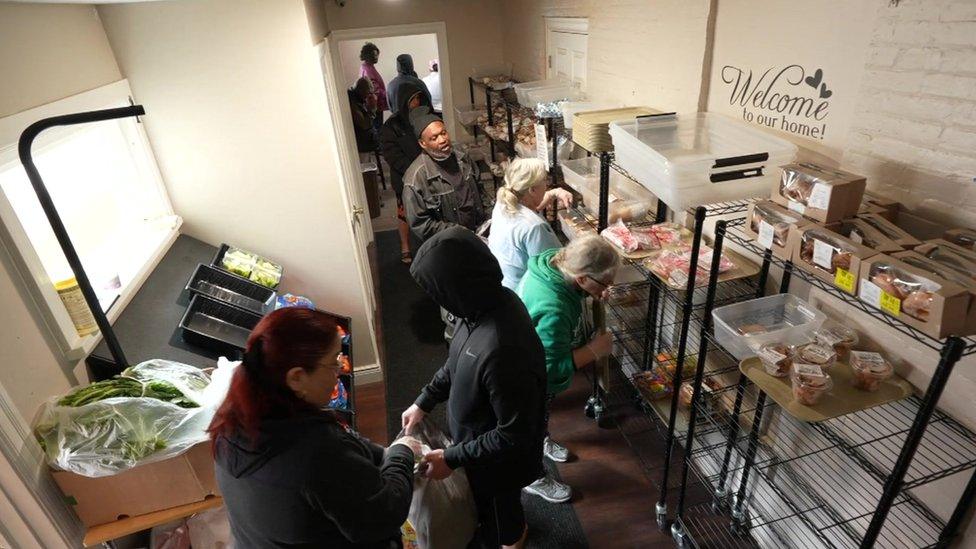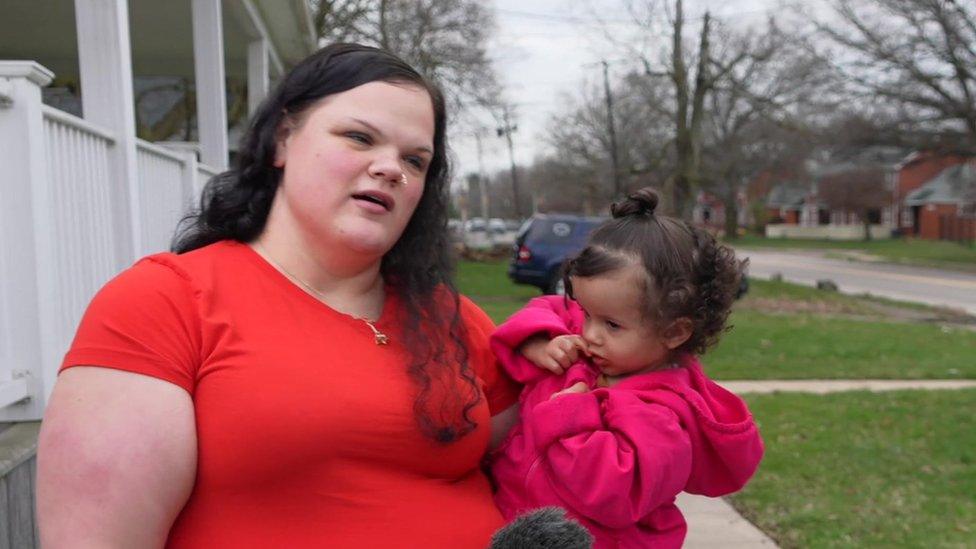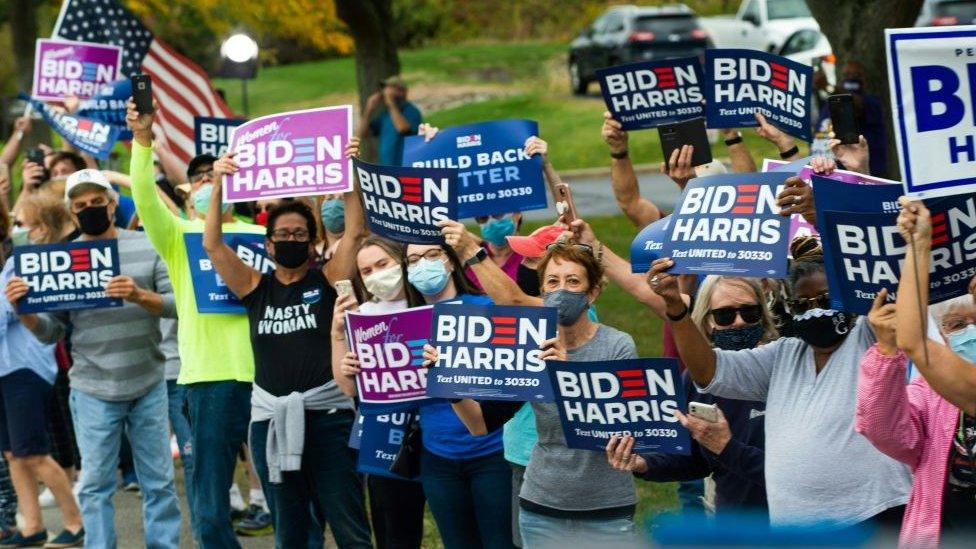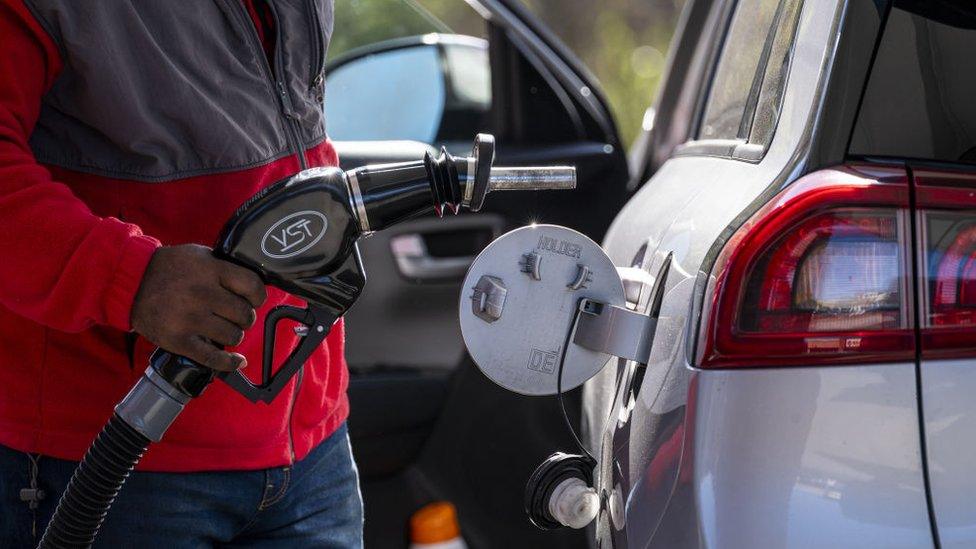Erie, Pennsylvania: A swing county Biden and Trump can’t ignore
- Published

Food displayed in Home House of Erie
A locked door at the back of a welcoming house opens and a long line of people, spanning the yard, move forward, each person showing a small ticket as they enter.
This is the Home House of Erie, a food pantry that gives out food three mornings a week in a neighbourhood on the edge of Erie, Pennsylvania.
At the back of the queue, Megan pushes her 18 month-old daughter in a pram while trying to wrangle her three-year-old twins, who are still in their pyjamas. Her five other children are at school.
"I come almost every time they're open," says 31-year-old Megan, who is unemployed and single. "It's a lot of good nutritious food in here."
Inside the house, which is laid out like a supermarket, she will pick up fruit, vegetables, meat, bread and other staples.
While she receives food stamps and Medicaid health insurance, getting free food is a "godsend... it would be a bigger struggle if they weren't here," she says.
Her circumstances will resonate with many Americans hit by a cost of living crisis and stubborn inflation. But here in Erie, there is extra reason for both presidential candidates to take heed.

Megan says the food pantry is a 'godsend' for her family
Almost all roads to the White House go through Pennsylvania, a swing state that proved pivotal in the 2020 election.
Donald Trump, the presumptive Republican nominee, will campaign there on Saturday. He did so in the last election, and also held a rally here last year.
President Joe Biden will spend half of next week in the state.
Erie meanwhile is a key swing county that acts as a bellwether for the rest of Pennsylvania. And it is in Erie, where one in eight people are considered food insecure, that inflation is a priority election issue.
Unemployment is only 4% here, close to the national average, and homelessness is relatively low, according to the mayor's office for the city of Erie.
But the food poverty is because of the price of groceries, says Kevin Nelson, the program director at Home House of Erie.
Prices in Pennsylvania are rising faster than in any other state, according to Datasembly Consumer Price Index, external - up 8.2% in the last year and nearly 25% over the last four years.
"Supermarket prices have gone up," he says. "Rent has gone up. Gas, electric, utilities," he adds. "So it hits the pocket."
His organisation helps between 900 and 1,000 families a year, and Mr Nelson says the numbers are rising.
Most of them have homes and jobs - just not enough income to make ends meet.
Nationally, prices are stabilising, wages are rising, and unemployment is falling. But that does not translate to the lived experience of many Americans, in Erie and beyond.
And those lived experiences can sway elections. That is especially the case for Erie.
Mr Biden flipped Pennsylvania back to the Democrats in 2020. It was only when the state was called for him on a Saturday, days after the election, that he secured his victory over Mr Trump.
In Erie, the margins were tiny. Mr Biden carried the county by only 1%. When Mr Trump won the state four years earlier, his margin in Erie was 1.5%.
Struggling in the day-to-day
The Second Harvest Food Bank of Northwestern Pennsylvania is seeing first-hand how people are struggling to cope.
It sources food for pantries, delivers pre-packed boxes to those who don't have enough to eat, and runs a backpack programme.
Each Friday afternoon, they put enough food in children's schoolbags to keep them going through the weekend.
This year the bank expects to deliver around 6,000 tons of food, up from 5,200 tons last year.
"During COVID, people had supplemental food stamps, and they had extra benefits that made it easier for them to stretch a dollar," says Ms Watt.
"Those sorts of things have been removed. And now people are really feeling inflation."
Ms Watt believes hunger "is a system of inequities" and so it does not matter who is the president or who is in Congress.
Still, the cost of living is on almost all voters' minds here, "although it is much lower than other places", says Joe Schember, the Erie mayor who grew up, attended college and raised a family here.

Biden supporters in Erie during the 2020 campaign
Testbed for a nation
"Pennsylvania goes whatever direction Erie goes," he says. It is a slogan repeated by almost anyone who will discuss politics, which is almost anyone you meet here.
Essentially a microcosm of the state, Erie has a mix of rural and urban voters, of agriculture and industry, of blue-collar workers and universities, and of religions.
Candidates test out a message or policy here, see how it goes, and either change or replicate it across the state and across the nation.
Joe Morris, the chairman of the Political Science Department at Mercyhurst University, gives an example of how crucial it can be for presidential campaigns to engage with local voters.
"One of the things we have not forgotten here in Erie is that in 2016, Hillary Clinton did not make a stop," he says.
"She flew over us on her way to Detroit. I think that would be an enormous mistake for both Biden and Trump in this election."

Trump speaks at a rally at Erie Arena in 2023
'A message to the masses'
Engagement leads to voter turnout, important to any election.
However, it's an area of concern for Republicans across Pennsylvania, says the chairman of the Erie County Republican Party, Tom Eddy, because of a new state law, Act 77, that extends voting by mail.
Republicans, he says, like to "go and vote on election day. And they'd like to vote by paper, so there's no potential interference with computers. And they think… that people should show ID to vote".
He believes voting by mail helped Democrats win the most recent Senate race in Pennsylvania, and is taking it upon himself to promote it. A retired teacher, he makes online videos on Mr Trump's policies and viewpoints.
"It's a great way to get the message out to the masses", he says. "And it costs me almost nothing."
With seven months until the election, it is hard to foresee which way this swing county and its swing state will go, and how the cost of living will factor into votes.
"I can't see a difference right now," says Kathy Schaff, a councilwoman. "We had hard times with President Trump and we're still struggling with President Biden."
Related topics
- Published11 April 2024
